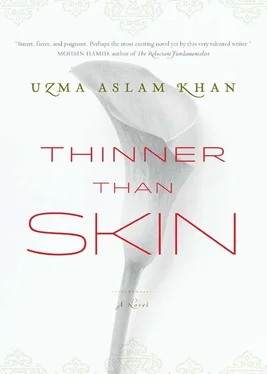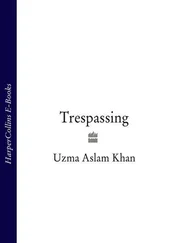She kept her gaze on the killer’s legs, the way they buckled as he hunkered back toward his tent. She watched for so long the baby began to fidget. But she did not cry. When Maryam finally tore her eyes away, she leaned into Kiran and kissed her brow, and stroked her cheek. She ran her hands over her wet clothes. Kiran’s shalwar was torn. From the fall or from a bite? Not a drop of blood, not a droopy fly. The child feared death less than she had feared water. She blew prayers over her cold flesh.
She picked her up. The dead were heavy, after only six years of life. So this was the weight that had permanently lodged itself in her chest. Very well, she would carry it. She adjusted Kiran in her arms till the cold chin of one pressed into the warm curve of the other and broken knees bunched against a heart that had stopped. She breathed in Kiran’s ear. “The sun is hot now, I’ll take you home.”
Beside Maryam, but several feet closer to the ground, Jumanah ran to keep up with her mother. For assistance, she clutched her sister’s bloating feet. She had once seen a man on a bicycle do the same. He held on to a racing bus as it carried him far and away. Now her mother was the bus, Kiran’s feet the two bicycle handles, and her own plump legs the wheels. She needed a third hand, really, to hold onto her mother the bus, but she could pedal faster. The air rushed around them as she heard her mother chant: He will fix this he will fix this he will fix this .
Naked Mountain: A View from Above
He sat in a café many miles north of the lake, in a town called Gilgit. He was taking his time appraising the two men from Xinjiang Province. He was a tradesman; he knew nothing was free. But the choice he faced now was different. The men did not have fingers and toes, at least not all of them. Studying their hands, he calculated the sum of their words.
They described to him, in minute detail, China’s plan to raze the old city of Kashgar. They had brought photographs as evidence of their pain: cobblestone alleys, labyrinthine in design, as interconnected as ancient trade routes. Spectacular mosques, also to be razed. On the walls of one mosque hung a poster forbidding individual pilgrimages to Mecca. The men also had images of abandoned internet cafés, after the freeze by the government last year, ensuring the complete isolation of their fight. The clean-up meted out to protesters involved a different kind of freeze. They were hosed with ice water, several hours at a time, in winter. The lucky few, like the two men beside him, were freed without fingers and toes.
Their isolation must end. He could help, could he not?
The men had brought what he wanted. It lay in a box on their table in the low-lit café, close to their hands. Inside the box lay a gift for the woman to whom he had sent a blue feather, days earlier. An impossible choice. There was a proverb down in the valley where he had once made his home. Neither dry in the sun nor wet in the rain . How was he to get himself out of this difficulty?
One man had palms like soft leather cups, wrinkled and worn. The right thumb and little finger were missing, but on the left hand, only the middle finger was gone. This man was asking why the hands had reacted asymmetrically. Had he curled each differently each time they hosed him? Had he left one finger more exposed? He wanted to know also if it would have been easier to adjust if both hands had suffered the same fate. Because, now, he found he could do absolutely nothing with the left hand, even though it still retained a thumb. “The left hand uses the right as an image of itself, but it has lost this mirror. It cannot learn.”
“It could have been worse,” said the other man, who had only lost his toes. And he did a trick, making all but one of his fingers disappear. He held it up. The two men chuckled. They kept their shoes on.
Ghafoor kept appraising them, trying to place them from four summers ago, on one of his trips to Central Asia.
He had stopped in Kashgar for a few days, where he traded, among other things, leather for jade. The Chinese military were parked in the province for the month, to parade military hardware through the heart of the city. In the sky droned circles of fighter jets. On the ground trooped 100,000 boots, several dozen tanks, armored personnel vehicles, and camouflaged trucks. He had never seen so many uniforms before. He had never seen so many weapons. He had never seen so many planes. The chief of general staff of the People’s Liberation Army was also present, along with more generals than he had seen even at one of Pakistan’s military parades. It took longer than it ought to have to find the trader he was to meet, and when he did, he learned the reason for the display.
It would show the Uyghurs of Xinjiang that ethnic separatism under the banner of East Turkestan and religious freedom and the Turkic tongue would never be tolerated. This was not East Turkestan. It was China.
Ghafoor spent the week listening to the army’s threats with one ear, and the bustle of the city’s main bazaar with the other. There were many Pakistani merchants here, all buying joggers, socks, track suits with English writing, and the Pakistani housewife’s favorite convenience: plastic buckets. He met a Uyghur who, after striking a deal for 4,000 pairs of socks, had closed shop for two months while feeding a family of twelve. He ate kebabs skewered on bicycle spokes. He bantered with peddlers who told him a joke that, in subsequent years, would grow slightly stale. (“What was the first thing Neil Armstrong saw when he landed on the moon …?”) He watched more currency exchange more hands in more tongues than even down in Gilgit. For, though Uyghurs were proud of their Turkic heritage, for commerce, accommodations must be made. When currency was converted, so was language. The best clients were “Soviets” from Central Asia and Russia. If treated right, a Soviet could help a man close shop for three months. Ghafoor learned a little Russian himself, a skill that proved especially useful with the many Kazakh traders living in Xinjiang, men with whom he would travel to Ghulja on the border, forging direct links with artisans high in the Kazakh steppe.
But that was to happen later. Four summers ago, despite the windows he sensed were opening for him, Ghafoor was unsettled by the tanks and trucks occupying the city, and by the Han migrants being brought in from outside the province. They would pave the cobbled roads that cut through Old Kashgar, and force native Kashgaris to leave. He knew what it was to be forced out, to roam from field to field as though you were an upal in a buffalo’s ass. It was partly for this reason that he had chosen to leave the valley of his birth. Better to choose, than to be forced. But the native Kashgaris were not choosing to leave, even when the cobbles beneath their feet were smashed, even when, for every donkey cart that sold polu and kebabs, there were two that sold liquor and pork. So he watched a history evanesce, alleys that once chimed with horsebells now clattering with cranes, mazes of mud-brick courtyards being flattened like naan, while, nearby, a colossal statue of Mao remained unshaken. “This is our al-Quds,” an old man whose family had fled the previous year told him. “I will never leave.” And when he added, “Will you help us?” Ghafoor had replied, “Of course.” But his eye, saturated with the grief of those he knew he could not help — he had not even been able to help his own people, though God knows he had tried — this saturated eye began to wander.
By the end of the week, Ghafoor had a mound of Kazakh, Chinese, and American currency in his purse, and the news at his back. He was vaguely aware of what it said. An East Turkestan separatist had been arrested in Pakistan. He had confessed to being the ring leader of a group planning attacks on China’s twelve new highway projects, each of which would cut through Xinjiang to connect China with Russia, Kazakhstan, Tajikistan, Pakistan, and ultimately, Uzbekistan, Iran, and Turkey. Upon his arrest, he publicly spat on the generous compensation Kashgaris would receive for resettlement. He spat also on the compensation for the herders whose nearby grazing grounds would be paved.
Читать дальше












